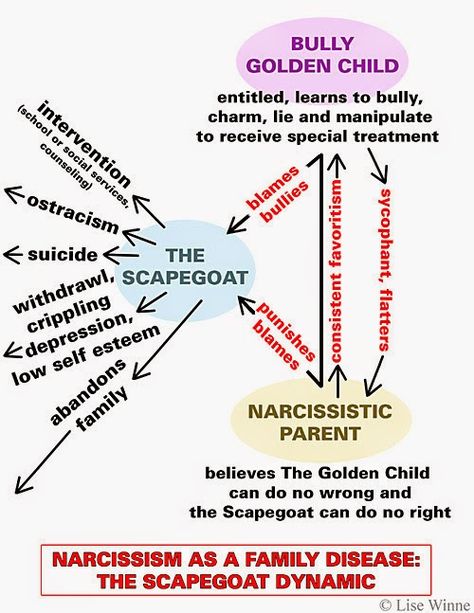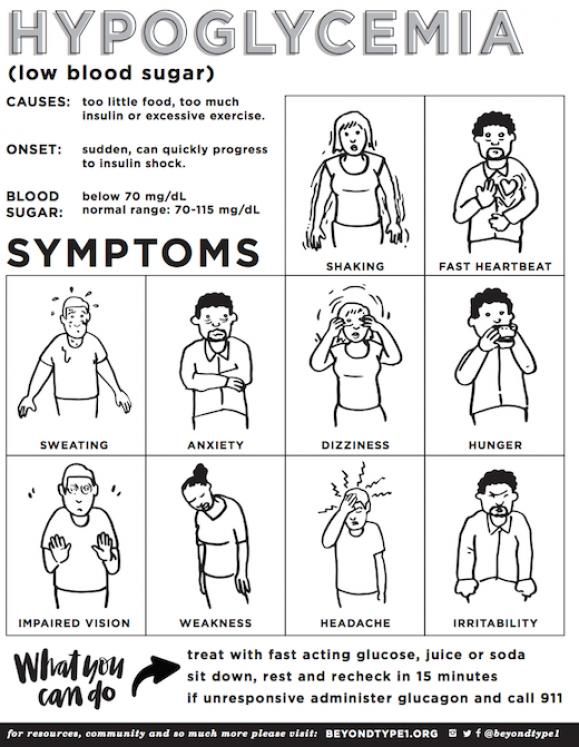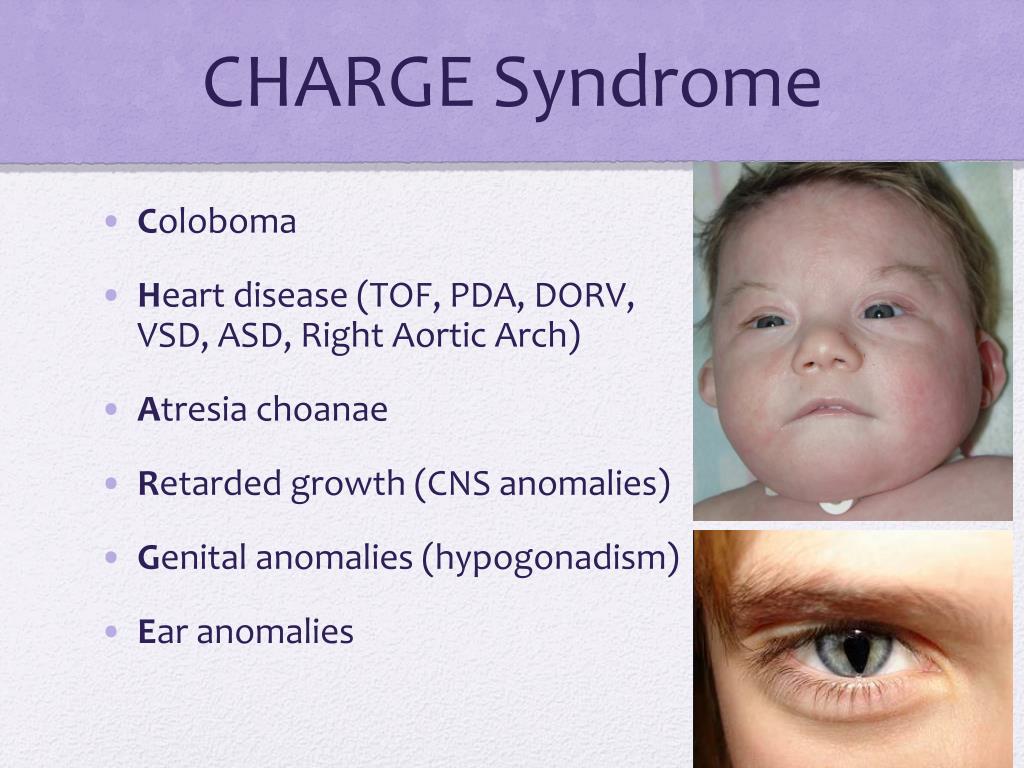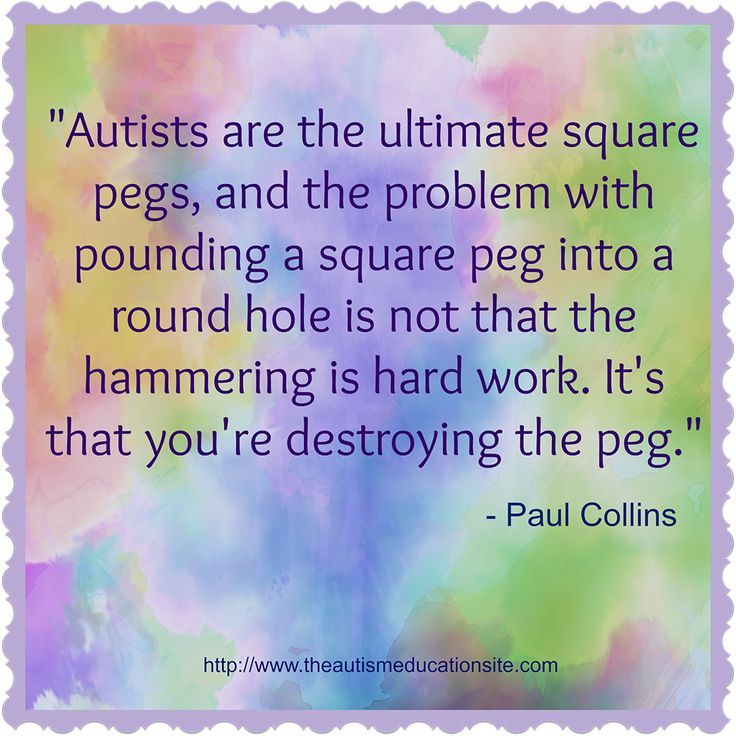Narcissistic personality disorder and lying
Why A Narcissist Lies And What It Says About Them
By Katherine Fabrizio on August 5, 2019
Sooner or later everyone tells a lie. In fact, over a lifetime, we all tell many lies. The narcissist, however, is a liar. It isn’t just what they do, it is who they are.
In my work with daughters of narcissistic mothers, daughters frequently can’t wrap their heads around why their mother would lie. Perhaps this will shed some light.
When confronted with the opportunity, to tell the truth, or tell a lie, most of us check in with our inner-selves to see if our answer feels right. This gut check is a calculation that happens automatically mostly at the unconscious level.
This is true even for liars.
Thus, we all act in accordance with our sense of… who we know ourselves to be.
The three-year-old, mouth rimmed with chocolate, who declares with impunity she was NOT the one who ate the half-eaten candy bar, is given a pass because we all know intuitively she doesn’t have a fully formed sense of self.
Narcissism is a disorder of the self. It isn’t so much an undeveloped sense of self as it is an impaired/fragmented sense of self. A self-based on opportunism instead of values. Life is a game and they play to win.
What happens when otherwise good people tell a lie?
Somewhere, somehow most people will lie. Given enough reason, fear or perceived gain, most of us will violate our sense of integrity, our internalized values. We make the calculation that an untruth is worth telling. If we aren’t a liar we feel bad, sometimes really bad.
We feel bad because who we know ourselves to be and our values don’t match up. This incongruencemakes us uncomfortable. It costs us to lie.
The narcissistic calculation is a different algebraic equation.
A narcissist’s lie also comes from his or her sense of self. The difference is that their life has become a lie.
When their life becomes a lie, their lying is different. Different because their sense of self is different.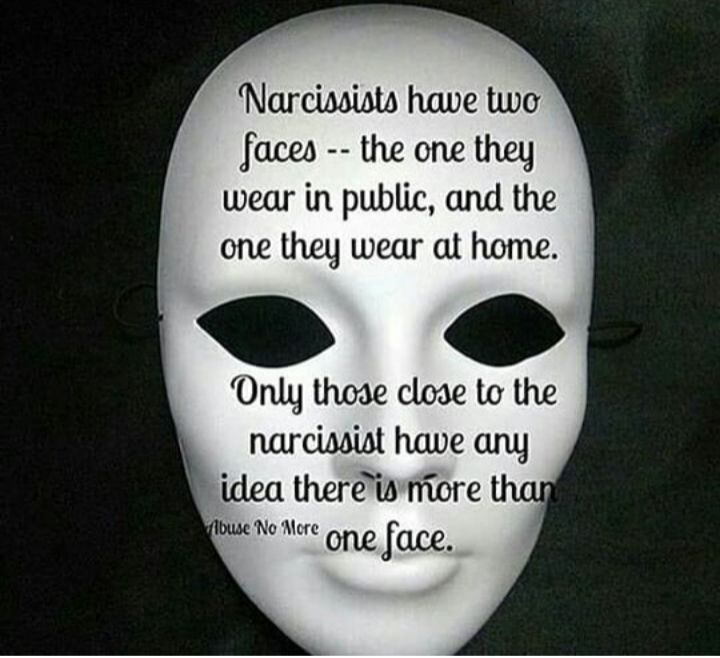 The lie is not inconsistentwith their sense of self. For them, the lie is a necessityto preserve what they regard as a self.
The lie is not inconsistentwith their sense of self. For them, the lie is a necessityto preserve what they regard as a self.
That self, however, is a set of defenses, not internalized values. That set of defenses stand as armed guards against a horrible cauldron of self-loathing of which they are mostly unaware. And, the defenses keep them unaware of the emotional pain that would otherwise swallow them up, or so they believe.
The secrets, the layers of lies, become a fragile house of cards. The self they have built from those lies can easily cave in on itself under the weight of truth.
The narcissist is operating from a place of defense all of the time. The lie is more a PR stunt, a marketing ploy rather than a cohesive integrated set of values. The narcissistic personality is more of a storefront designed to hide that there isn’t any there, there. They can’t ever let down their guard and let anyone in.
There is no true capacity forintimacy.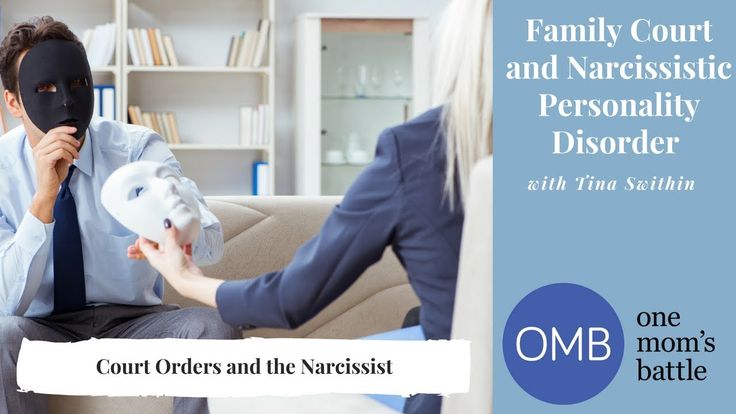 They can’t invite you into the store because the store is full of empty discarded garbage. They want you to buy the fiction that the storefront is so dazzling you wouldn’t need to come inside. “Nothing to see here…move along”. They may have tons of friends, be the life of the party but no one knows the whole story. There will be gaps in their stories and in their lives.
They can’t invite you into the store because the store is full of empty discarded garbage. They want you to buy the fiction that the storefront is so dazzling you wouldn’t need to come inside. “Nothing to see here…move along”. They may have tons of friends, be the life of the party but no one knows the whole story. There will be gaps in their stories and in their lives.
They are marketing a self they want you to believe. They need you to believe the storefront is the store. These days that can manifest as a carefully curated Facebook page or Instagram Feed. If they are convincing enough to others then maybe, just maybe they can believe it too. They don’t experience it as manipulation or lying, not exactly… they feel it is necessary for survival, psychological survival.
Intimacyis too threatening becauseyou would wantto come inside and have a look around. They can’t afford that risk.
What you don’t see – true humility and remorse for mistakes made. That takes self-reflection and honesty. If they have a public downfall that they can’t totally deny they will simply be the after in a before and after study. Voila’ transformation! Look more closely and you will see they take no ownership in their struggle because there is none.
That takes self-reflection and honesty. If they have a public downfall that they can’t totally deny they will simply be the after in a before and after study. Voila’ transformation! Look more closely and you will see they take no ownership in their struggle because there is none.
“I had to lie.You see circumstances were such it only made sense for me to lie. Externalconditions forced me to lie- I would be stupid not to.” What they are not saying is that their lie is an outgrowth of internal conditions or that it violated their values. There is no accountability for lying. Because they aren’t taking accountabilitythey are telling you they will find a rationale to lie in the future. And, they will lie to you.
“The other person is so ridiculous/stupid/unreasonable they left me with no other choice. “They put the responsibility for lying on the other person. “Theymade me do it.” Again you see the lack of accountability coupled with the denigration of the other.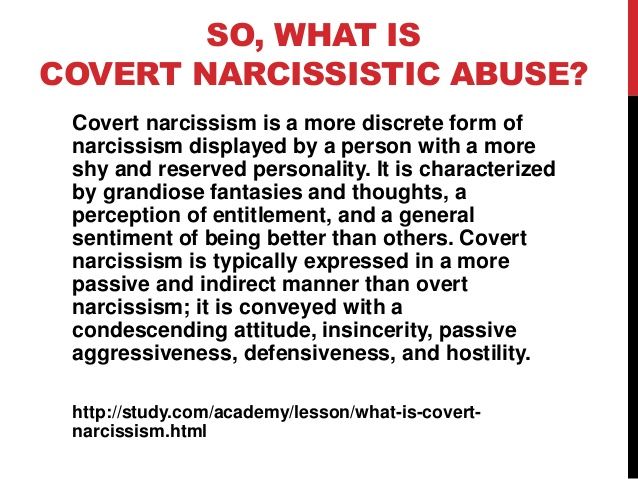
“I am protecting someone by lying to them.” If they knew the truth it would hurt them. Not that everyone needs to know every thought or fact about our lives.However, the narcissist will mislead, omit or outright lie about huge aspects of their lives and tell themselves they are protecting people, not hurting them.
All of these excuses reflect an impoverished and distorted sense of self.Paradoxically they aren’t lying… not exactly, they are speaking the truth of who they are.
- It bears saying that the fractured abusive childhoods that create the need for this level of narcissistic defense imprison their victims in lives that are hard if not near impossible to heal from. When a person lies as a manner, of course, they not only do relational violence to others, tragically, they do it to themselves.
Wondering if you are in the role of the Good Daughter of a narcissistic mother? Take the quiz – it’s free.
12 Of The Most Common Lies Sociopaths And Narcissists Tell, Translated
It’s common knowledge that manipulative personalities tend to engage in a great deal of pathological lying and deceit.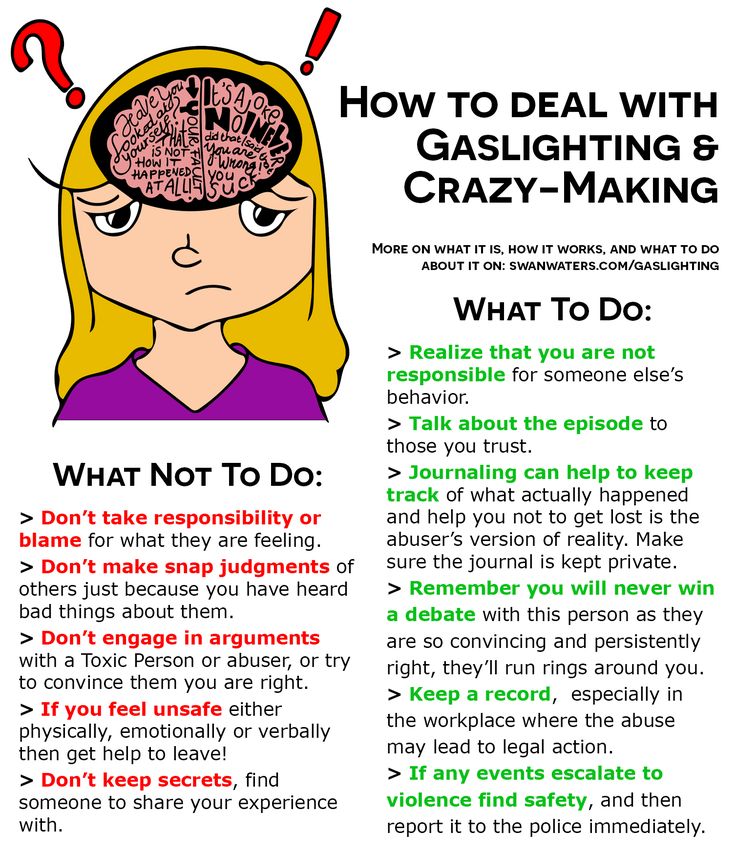 In fact, compulsive lying is associated with narcissistic and antisocial personality disorders – likely connected to the lack of empathy and propensity for exploitative behavior inherent in these disorders (Ford, King & Hollender, 1988; Baskin-Sommers, Krusemark, & Ronningstam, 2014).
In fact, compulsive lying is associated with narcissistic and antisocial personality disorders – likely connected to the lack of empathy and propensity for exploitative behavior inherent in these disorders (Ford, King & Hollender, 1988; Baskin-Sommers, Krusemark, & Ronningstam, 2014).
How do they get away with their lies? Covert wolves in sheep’s clothing build a very convincing, charismatic false mask for society and often have a great deal of “social proof” in the form of enabling supporters who believe in their facade. They lead double lives and engage in con artistry under the radar, often going unnoticed for years.
Yet there are common lies narcissists and sociopaths tell their victims that, if translated to the truth, would expose the reality behind their actions.
Some of these phrases can be uttered by those who are not narcissists. However, when expressed by a predatory personality in the context of manipulation, the following statements carry a far different and darker meaning.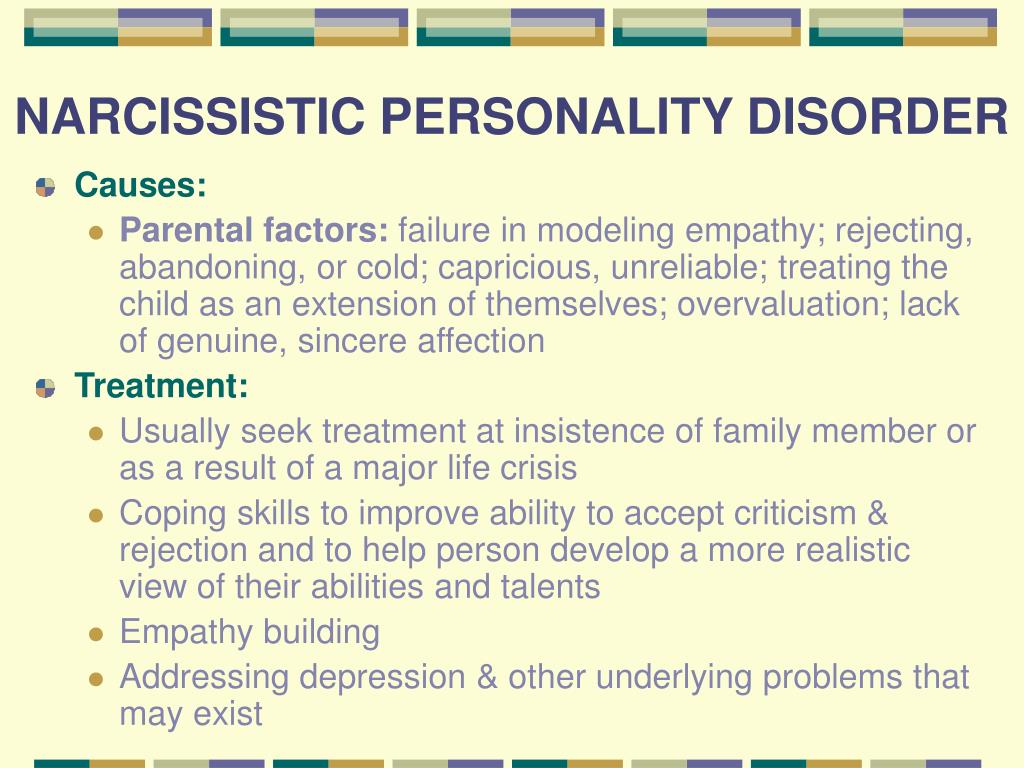
Here are twelve of the most common lies narcissists and sociopaths tell us, translated into what they actually mean:
1. I would never lie to you.I am lying as I say this. You do know that an authentic truth-teller wouldn’t have to convince you, right? The reason I constantly have to tell you I would never lie to you is because I know you will eventually find the discrepancies between what I say and what I do. When you’re struggling to understand why I am acting with such cruelty, youll remember how I stressed to you that I am an honest person, a person of integrity and character – a person who would never do such things. Youll be confused because my actions speak so differently than my words. Slowly but surely, I am brainwashing you into believing that I would never lie. That will create a conflict in you enough reasonable doubt for whenever my lies come to the surface. Youll want to believe in the person I pretended to be, rather than who I really am.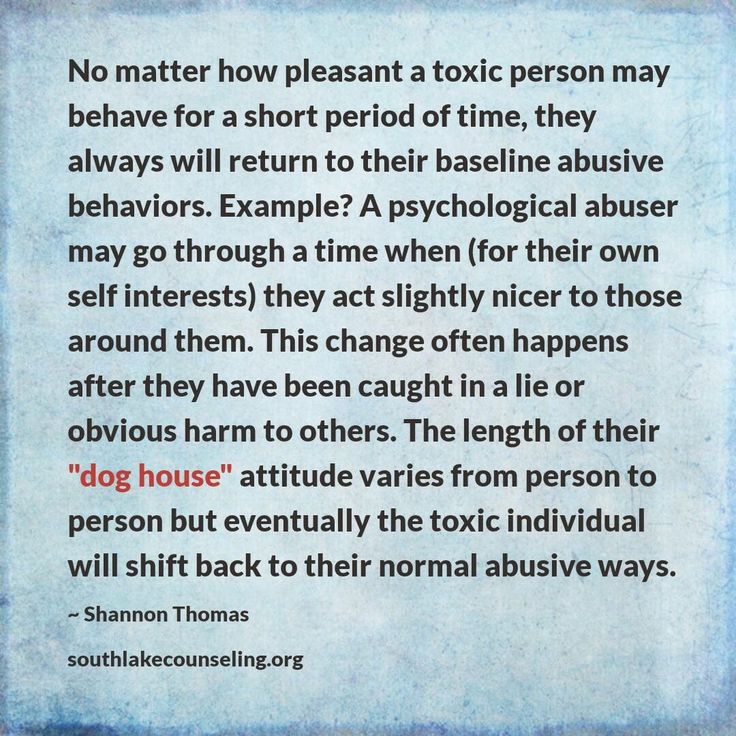
My past victims discovered my infidelity, my falsehoods and even gained a momentary glance behind the mask. They called me out, even tried to expose me. They tried to hold me accountable for my actions. Dont be surprised if they reach out to warn you but by the time they do, youll be convinced theyre crazy and obsessed with me. Theyre just jealous of what we have – or at least that’s what I’ll tell you. Theyre just stalking me because they want me back so desperately couldnt have anything to do with the pain Ive inflicted upon them, right?
3. I was hanging out with friends.I am busy grooming my primary source of narcissistic supply, an old flame or a new victim. Ive got lotsof friends in my harem who worship me and who need my time. Rest assured, theres always plenty of ego strokes to go around for me. Any time I disappear, you can bet I am love-bombing someone and getting the attention I am entitled to.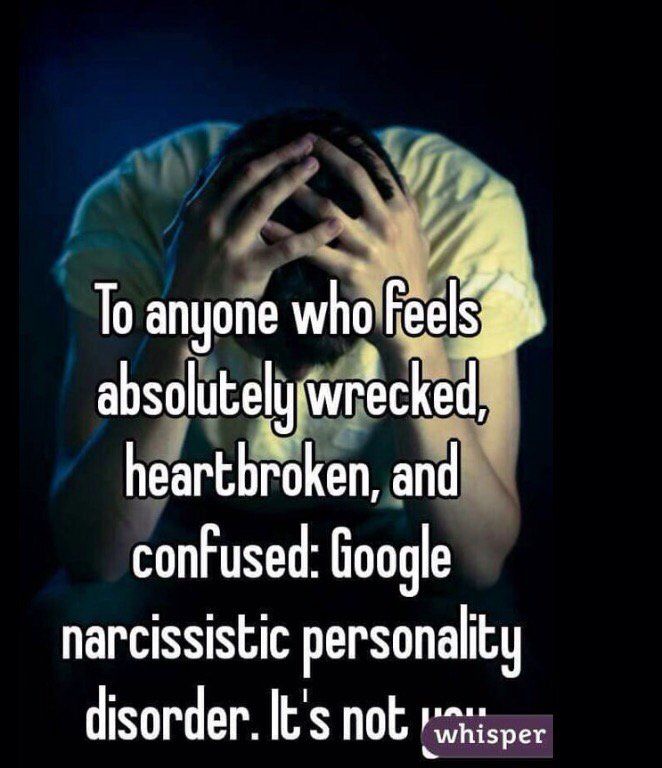 I am just that special. Don’t worry, you can be my “friend” too!
I am just that special. Don’t worry, you can be my “friend” too!
Youre my transitional target, not my primary one something to keep me satisfied in between my two or more significant others. I am so busy sleeping with my boyfriend and girlfriend over the weekend, taking out my various affair partners out on weeknights and flirting with anything that moves in my spare moments.I simply dont have the time to invest in you while entertaining so many others. However, Ill be happy to keep you waiting for my attention on the sidelines so I can tap into your resources whenever Id like. And who knows? Perhaps if one or two of my victims ‘bow out’ you’ll get to occupy a new position on my weekly rotation. How fun would that be?
5. Its crazy how much we have in common.Its not crazy at all, it’s perfectly calculated. Ive studied you and I am mirroring you, just like I have done with all of my other victims. I know your deepest wounds and desires, because upon first meeting you I poked and prodded to uncover your strengths, weaknesses, interests, passions and everything youre missing from your life. Now Ill morph into what you have always wanted in a partner at least, for the time being until I get what I want. Then, I’ll take the mask off from time to time. Soon, you won’t be able to recognize the person you first fell in love with.
I know your deepest wounds and desires, because upon first meeting you I poked and prodded to uncover your strengths, weaknesses, interests, passions and everything youre missing from your life. Now Ill morph into what you have always wanted in a partner at least, for the time being until I get what I want. Then, I’ll take the mask off from time to time. Soon, you won’t be able to recognize the person you first fell in love with.
I want to know that I still have control over you and your life. This is atest and Ill often “check in” with you after I disappear for days, subject you to a hideous violation or silent treatment, or make you jealous by showing off my newest victim. I am checking in to see that I am still significant that you still ache and long for me. I am sure you remember me. How could you possibly forget?
7. Cheating is morally wrong.Cheating is wrong if youdo it.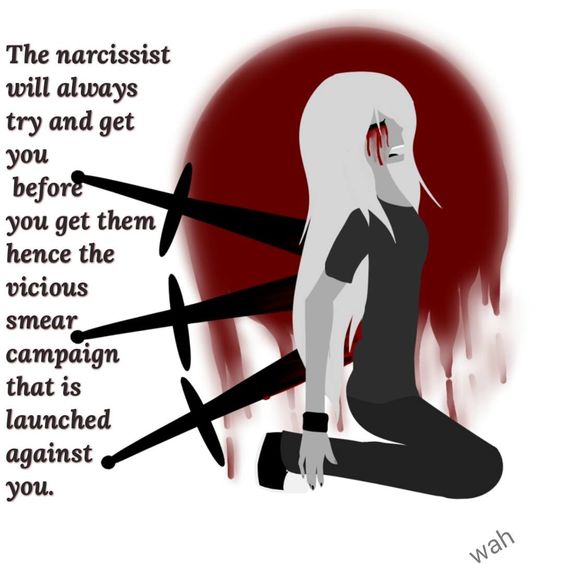 I have very different standards for myself. I expect and demand complete loyalty and transparency from you. However, I am free to carry on numerous affairs, treat you like a side piece or lie to you about the fact that I am already committed to someone all while stringing you along for money, sex, companionship, praise whatever else you have to offer me.
I have very different standards for myself. I expect and demand complete loyalty and transparency from you. However, I am free to carry on numerous affairs, treat you like a side piece or lie to you about the fact that I am already committed to someone all while stringing you along for money, sex, companionship, praise whatever else you have to offer me.
God, all this rivalry over me? Please, keep going. How absolutely exciting. I get so bored when I am in a long-term, committed relationship. Its wonderful to create these love triangles and have so many people compete over me. I thrive on the validation and attention of so many admirers. I will never really choose anyone I just enjoy the game of always choosing myself and my own needs first.
9. My ex was so dishonest and toxic.I was of course the toxic and dishonest one, but you wont figure that out until its too late.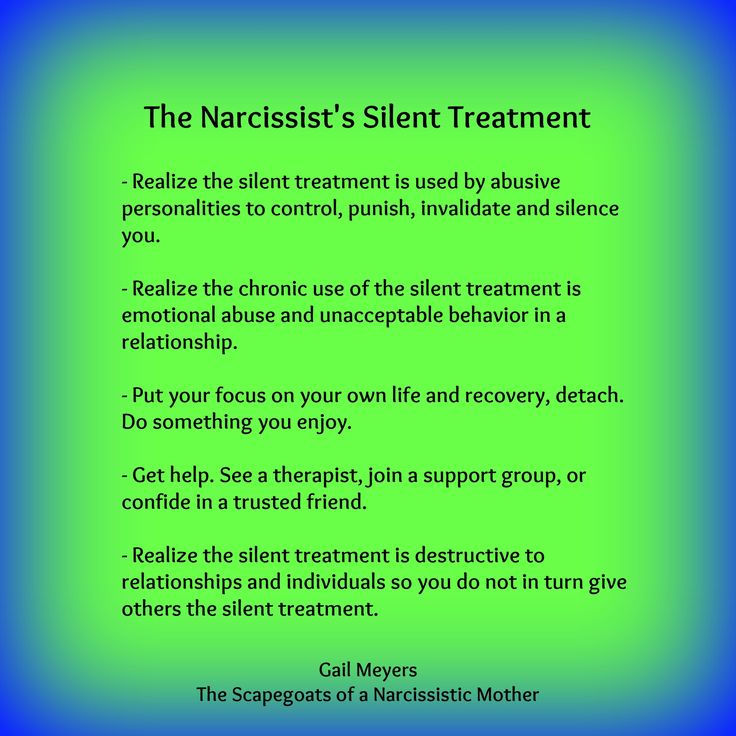 I betrayed my previous partners and they found out. Of course, by then, I had to discard them because they had seen behind the mask and they were no longer willing to invest in forgetting my crimes. And now, I have to do some damage control by convincing you that I am someone you should pity and take care of – someone who’s been hurt by others in the past. Feel sorry for me. Nurse me back to emotional health. Come closer. The truth is, I prefer to be the one inflicting pain.
I betrayed my previous partners and they found out. Of course, by then, I had to discard them because they had seen behind the mask and they were no longer willing to invest in forgetting my crimes. And now, I have to do some damage control by convincing you that I am someone you should pity and take care of – someone who’s been hurt by others in the past. Feel sorry for me. Nurse me back to emotional health. Come closer. The truth is, I prefer to be the one inflicting pain.
I love leaving the places where my victims have me figured out and starting over. With each new destination comes a whole new life and identity where I dont have to ever deal with the consequences of my actions or the people who know my true self. Once Ive exhausted my numerous victims in each city and state, its time to pack my bags and go on a new vacation. I leave a trail of victims wherever I go.
11. I used to be a player, but now I am a changed man or woman.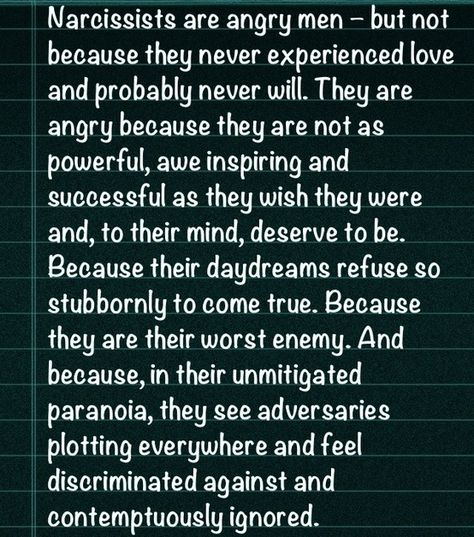 Now I want a meaningful relationship and a life partner.
Now I want a meaningful relationship and a life partner. Are you buying this bullshit? I hope so, because Id like to sleep with you soon and making you think that we may one day be in a relationship is the first step to getting in your pants. Ill fake some shame to go along with my reformed image. I am so deeply remorseful for all those Ive hurt in the past and Ive really learned my lesson not!The truth is, I’ll never change.
12. I am truly sorry, I really am.This is not who I am.This is exactlywho I am and my behavioral patterns should have tipped you off by now. Sure, I’ll apologize from time to time to get these discussions over with and to make you think I really want to change or that this was a momentary lapse. I hope youre buying it, because if you let me back into your life again, youre in for one hell of a ride.
What is Narcissistic Personality Disorder
Narcissists are often thought of as narcissistic people who are pleased with themselves, but in reality they are often deeply unhappy.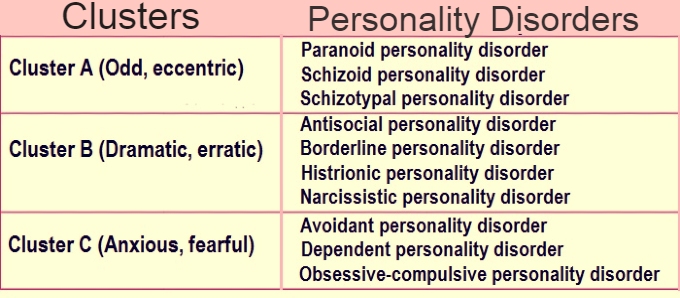 Afisha Daily talked to people diagnosed with narcissistic personality disorder and also asked a psychiatrist how to live with it.
Afisha Daily talked to people diagnosed with narcissistic personality disorder and also asked a psychiatrist how to live with it.
Narcissism is a mental trait shrouded in many myths. Narcissists are feared and sometimes envied, portrayed as those who easily manipulate other people's feelings for personal gain. On any psychological resource you can find a lot of advice on how to save yourself from a charismatic, but heartless and extremely dangerous narcissist (he usually appears in the guise of a successful man).
In reality, the real narcissist's world is not at all rosy. An inflated ego protects a very vulnerable person who is tormented by anger, shame, disappointment in life and a tendency to depression. Afisha Daily talked to people whose diagnosis sounds like "narcissistic personality disorder" and a psychotherapist to find out what narcissism is from the point of view of science and what it's like to live with this feature.
Artem
Radio engineer, Australia
How to detect narcissism
I had no idea what exactly my problem was until it was pointed out to me directly.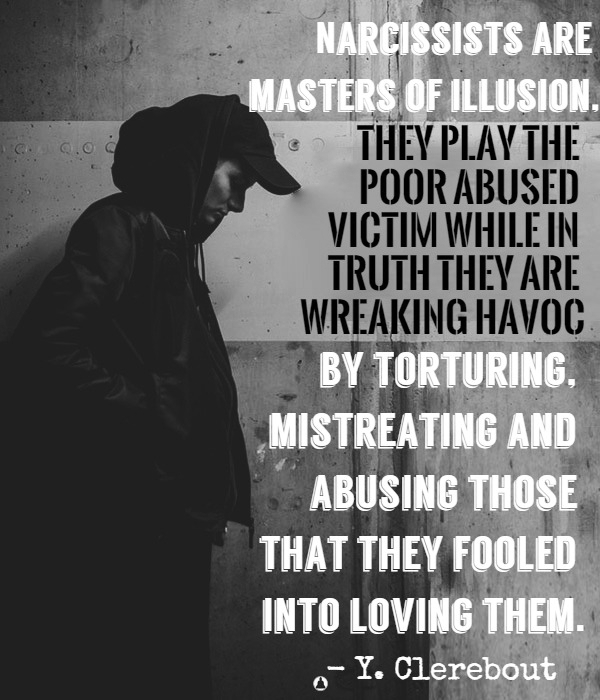 Once I had depression, during which I started looking at groups about mental problems on the net. In the community dedicated to bipolar disorder and narcissism, I found many life things. On the advice of the group admin, I went to psychologists and psychotherapists, who pointed to a pronounced narcissistic radical. At first, experts believed that it appeared due to an exacerbation of bipolar disorder, but in the end I was diagnosed with narcissistic personality disorder.
Once I had depression, during which I started looking at groups about mental problems on the net. In the community dedicated to bipolar disorder and narcissism, I found many life things. On the advice of the group admin, I went to psychologists and psychotherapists, who pointed to a pronounced narcissistic radical. At first, experts believed that it appeared due to an exacerbation of bipolar disorder, but in the end I was diagnosed with narcissistic personality disorder.
The disorder greatly affects both my condition and mood. And I'm not just talking about a "bad" or "good" mood, but about severe depressions that can lead to suicidal attempts, binges and self-destruction. And there are moments of "grandness" when you feel like the king of the world. There is rarely anything in between. By the way, even in depressive states, megalomania does not disappear.
I feel exhausted from narcissism because I constantly have to do something, but nothing brings me pleasure if it does not work for status or recognition.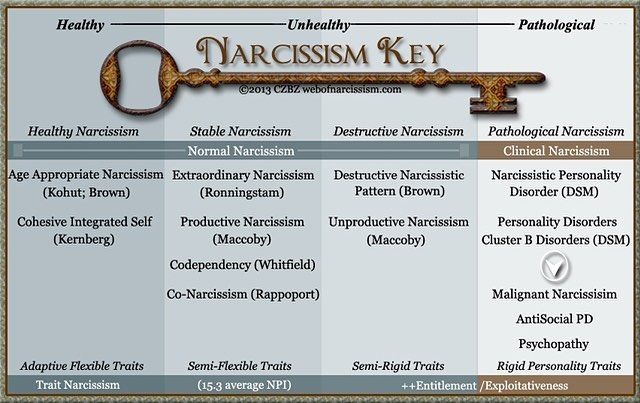 I can't do something just because I like it.
I can't do something just because I like it.
It seems that in order to be happy, I need to become the king of the whole world. But even if I became one, I would still be dissatisfied. There is only short-term narcissistic euphoria, and there is no happiness and pleasure from life.
How narcissists really live
The image of the narcissist in popular culture as a narcissist who exploits mere mortals is close to reality, but very superficial. Everyone is capable of taking advantage of others and everyone is narcissistic in some way. Perhaps there are tough manipulators among narcissists, I can't speak for everyone, but in general we are strongly demonized.
Narcissism also has some advantages. For example, I need to always look good in front of others, and this pays off. I know how to raise other people's sense of self-importance, because I myself need it. I also can’t have sex with just anyone, I can only do it with special and very close people to me, because others are not worthy of my attention. But there are more cons. For me, the main difficulties are envy of more successful people, depreciation of my own achievements, a feeling of emptiness inside and constant rivalry.
But there are more cons. For me, the main difficulties are envy of more successful people, depreciation of my own achievements, a feeling of emptiness inside and constant rivalry.
Behind the narcissist's charisma lies a fear of appearing ordinary, behind ostentatious narcissism is a very low self-esteem, behind arrogance is a fear of insignificance, behind exploitation is a desire to be accepted.
I have no desire to constantly use people, and I do not. I also have no need to hurt anyone. But I need to be special in the eyes of others, worthy people, I need their recognition. If you don’t get this, you quickly slide into a feeling of your own insignificance and paranoia. This is called the lack of narcissistic nutrition, which shakes the mood.
I can't open up to people because it's embarrassing. This shame is unbearable, but sometimes I don’t even realize it, because the fear of shame is even stronger.
Envy in narcissism is very painful. It really hurts from her.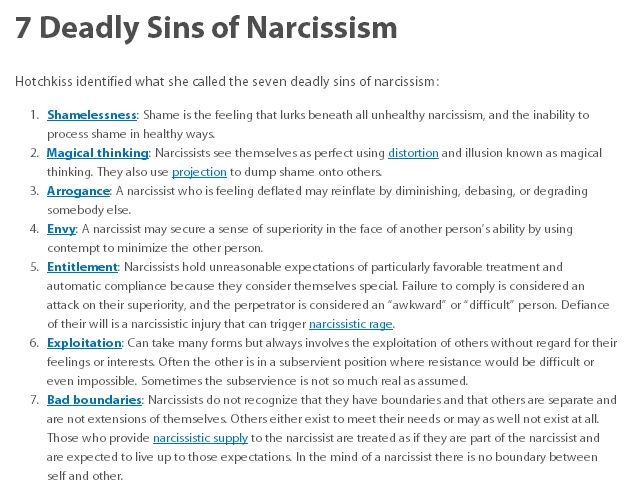 You can just see how someone is having fun hanging out, and that's it, you immediately feel bad.
You can just see how someone is having fun hanging out, and that's it, you immediately feel bad.
Or depreciation. Everything that I have achieved in life will be devalued by me in a short time - a new house, an expensive car quickly become nothing, as if it never happened. And because of this, it’s empty inside, you gradually fall into depression.
In relationships, unfortunately, the same. I idealize people because I need special people. But idealization sooner or later passes, and I lose interest in an ordinary person. That's the end of the relationship.
Rivalry among narcissists is also not very healthy. You don’t notice how you start to compete even with the guy in the queue for a psychotherapist.
I don't have examples to inspire because they are perceived as rivals. If my girlfriend becomes successful, I compete with her.
There is a feeling of emptiness inside me - this is due to the lack of a real personality. That is, it exists, but it is hidden very deeply, because it was badly wounded in childhood.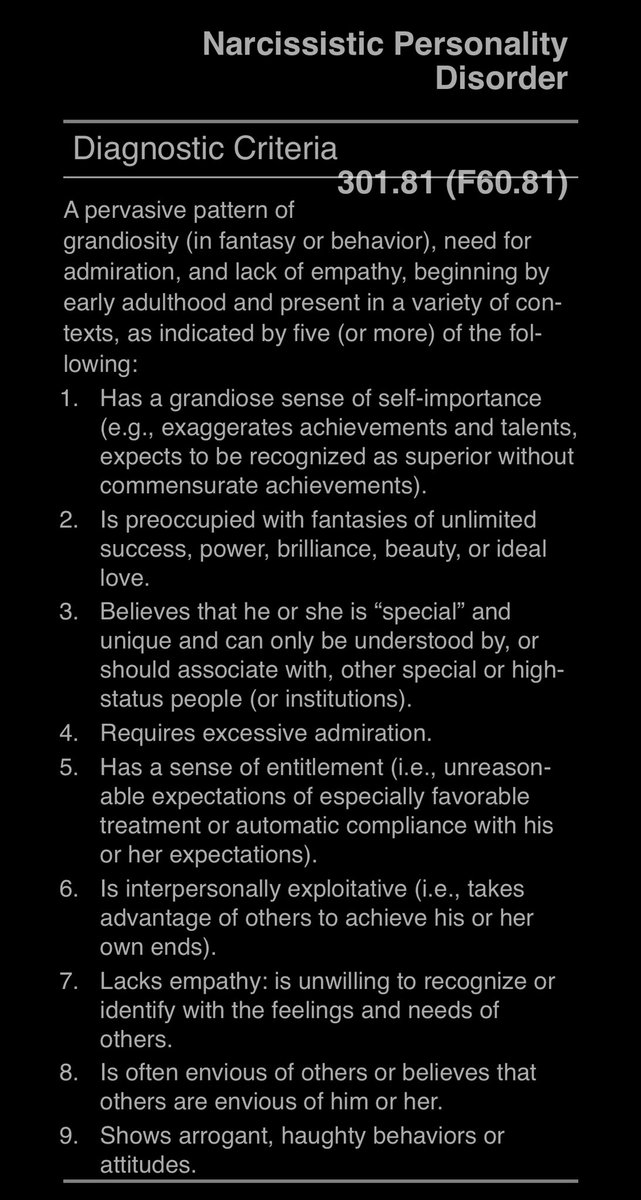 If someone hurts the real you, there is fear. As a result, you hide even deeper. And then you yourself don’t understand where you are real: what features are really yours, what feelings you experience, how you really relate to people. You don't know anything about yourself. But at the same time, you feel that everything around is hostile.
If someone hurts the real you, there is fear. As a result, you hide even deeper. And then you yourself don’t understand where you are real: what features are really yours, what feelings you experience, how you really relate to people. You don't know anything about yourself. But at the same time, you feel that everything around is hostile.
I would like to have a healthy narcissism like other people. So that my achievements make sense, so that it is easier in relationships, so that I don’t exhaust myself with constant attempts to achieve something that never bring satisfaction.
How to cope with narcissism
Doctors told me that narcissists need to be “warmed up”, that is, to be an understanding, loving partner for them, who does not criticize or compare with anyone. Also, the partner can repeat the narcissistic injury, but with a positive outcome, that is, show that it can be different. But for this, it is necessary first to ensure that the narcissist trusts his partner or therapist with his real self, and before that he himself realizes what he is real.
Non-specialists often unknowingly take on this task, do everything wrong and, as a result, harden us even more. Therefore, I recommend professional psychotherapy.
I once managed to be ordinary for a short time thanks to a healthy relationship. The girl accepted my antics to the end and saw me as special, even when I revealed my vulnerabilities. She was unconditionally with me in everything and considered me perfect. Then we gradually began to move on to the fact that I can be worse than others in some ways, but she still loves me. This took about four years. And then I got aggravated again. But I believe that in the future I will be able to cope with frustration and not act like an asshole through love and acceptance.
Elena Shmeleva, 20 years old
Face Your Disorder public admin panel
How to understand that you are a narcissist
I first thought about the reasons for my condition after a friend said that I look like a person with a narcissistic disorder.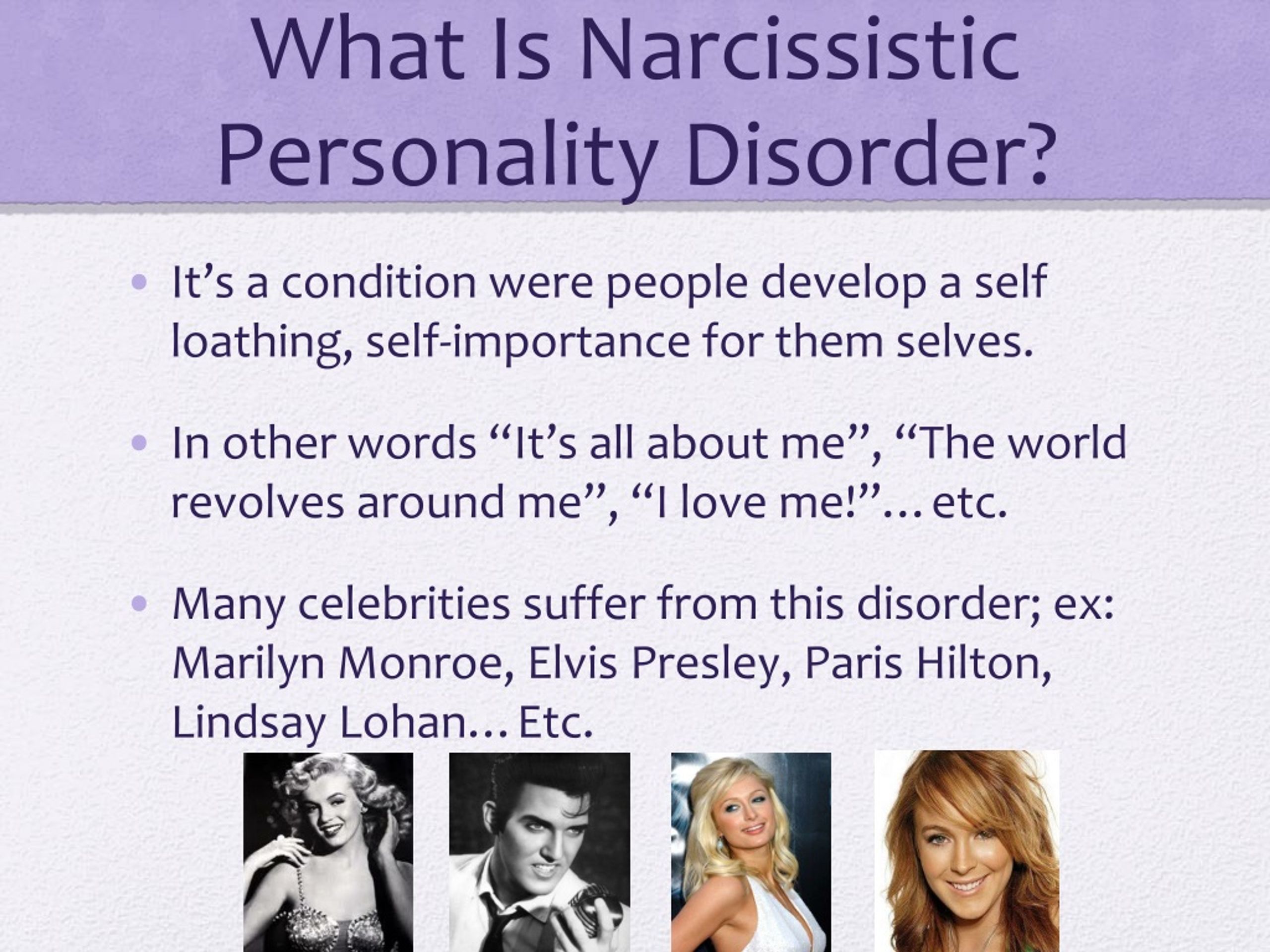 I decided for fun to take a couple of tests on the Internet for NPD (narcissistic personality disorder. - Note ed. ) and was shocked when I got the maximum score. I decided to study the issue, and then for the first time in my life everything fell into place. Everything was like in classic articles: “I read the stories of patients, studied the symptoms and saw myself in each of them.” Later, a psychiatrist confirmed that I had three diagnoses: narcissism, bipolar disorder, and an eating disorder.
I decided for fun to take a couple of tests on the Internet for NPD (narcissistic personality disorder. - Note ed. ) and was shocked when I got the maximum score. I decided to study the issue, and then for the first time in my life everything fell into place. Everything was like in classic articles: “I read the stories of patients, studied the symptoms and saw myself in each of them.” Later, a psychiatrist confirmed that I had three diagnoses: narcissism, bipolar disorder, and an eating disorder.
I would like to note right away that NRL is primarily a problem for the patient himself, and not as is commonly believed. Not all narcissists are monsters and abusers, although we are able to piss off others with ostentatious self-confidence and a desire to be in the spotlight.
Living with NPD is hard because this disorder makes happiness unattainable.
Some will object that it is a priori impossible to be happy all the time. But it is impossible for a narcissist to be satisfied with anything even for one week. The joy will last at best for a couple of days, and then we will again plunge into the swamp of self-criticism. Even if you have achieved everything, it will sadden you, because now the dream is over and there is nothing to strive for. A narcissist has two paths in life: either you become a workaholic and break into a cake in order to achieve heights (and it doesn’t matter in what exactly), or the desire to even try will die in you.
The joy will last at best for a couple of days, and then we will again plunge into the swamp of self-criticism. Even if you have achieved everything, it will sadden you, because now the dream is over and there is nothing to strive for. A narcissist has two paths in life: either you become a workaholic and break into a cake in order to achieve heights (and it doesn’t matter in what exactly), or the desire to even try will die in you.
What the public thinks of narcissists
In society, when people talk about narcissists, they always mean the grandiose version of the disorder. But there are no less depressive narcissists, and they are far from this brilliant image.
The grandiose narcissist was able to adapt to parental pressure with the "win always" mindset. Imagine Tony Stark from Marvel comics - in my opinion, the most flamboyant grandiose daffodil.
A depressed narcissist in the same circumstances will fold his hands and will not even try to express himself.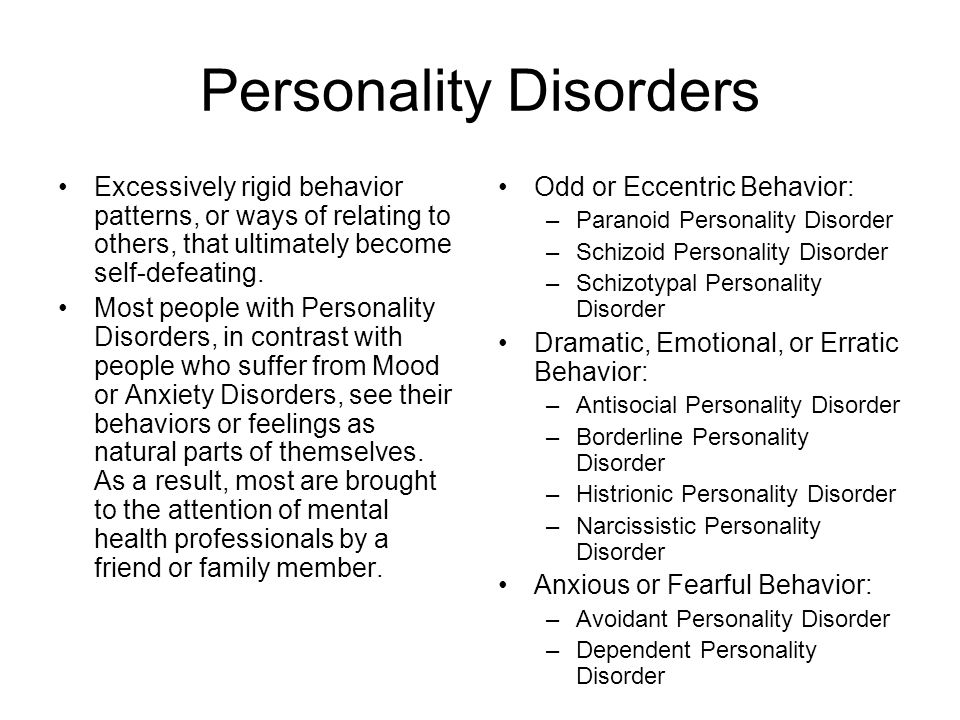 I think the reason is that in childhood he was so crushed by demands that he lost hope of becoming better than his peers in some way. However, if you dig deeper, they are brothers in spirit, since both live with an emptiness inside that cannot be filled. There are also mixed types of narcissism (just my case): a person who outwardly is prosperous and self-confident, but in fact he is constantly devoured by self-criticism and fear of competition.
I think the reason is that in childhood he was so crushed by demands that he lost hope of becoming better than his peers in some way. However, if you dig deeper, they are brothers in spirit, since both live with an emptiness inside that cannot be filled. There are also mixed types of narcissism (just my case): a person who outwardly is prosperous and self-confident, but in fact he is constantly devoured by self-criticism and fear of competition.
Our most hated myth : "All narcissists are evil abusers." There are many resources on which women demonize violent men. They are sure that if the ex-husband is the last asshole, he beat, scolded, limited everything, then he is definitely a “toxic narcissistic psychopath”. But to be an asshole, you don't have to have any disorder and even, imagine, you don't have to be a psychopath. Narcissism shouldn't be a stigma that turns the average person into a villain, it's a personality disorder that hurts ourselves in the first place.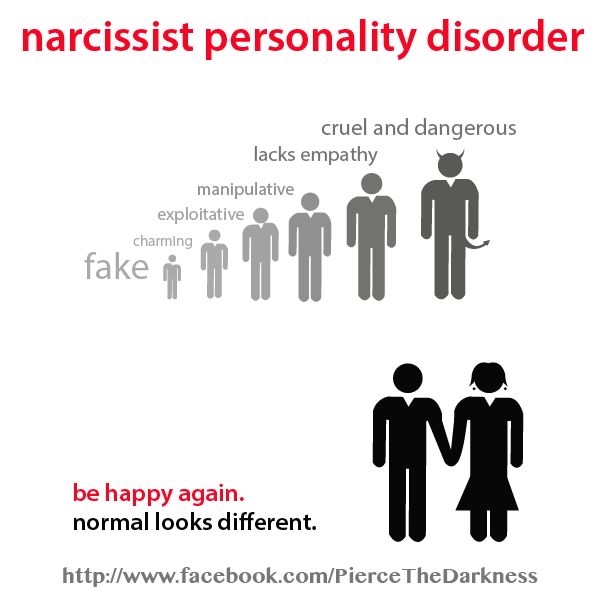
Myth 2 : “Children who are spoiled too much become narcissists.” Also fundamentally wrong. There is little in common between high self-esteem and narcissism.
Most often, narcissists are unloved children who have been criticized and shamed for not being perfect.
Third myth : "Narcissists are heartless and unable to listen, help, sympathize." In addition to emotional empathy, which we have weakened, there is intellectual. Even if we do not experience what you feel, we are able to imagine what it is like, listen carefully and give advice. Such support has an advantage: the ability to analyze the situation and find a way out with a cold mind.
About the peculiarities of living with narcissism
It's hard to talk about the benefits of a personality disorder, but in some ways it really helped me. In the darkest periods of my life, it more than once saved me from suicide, because I could not afford to "leave unknown, unsuccessful and useless to anyone.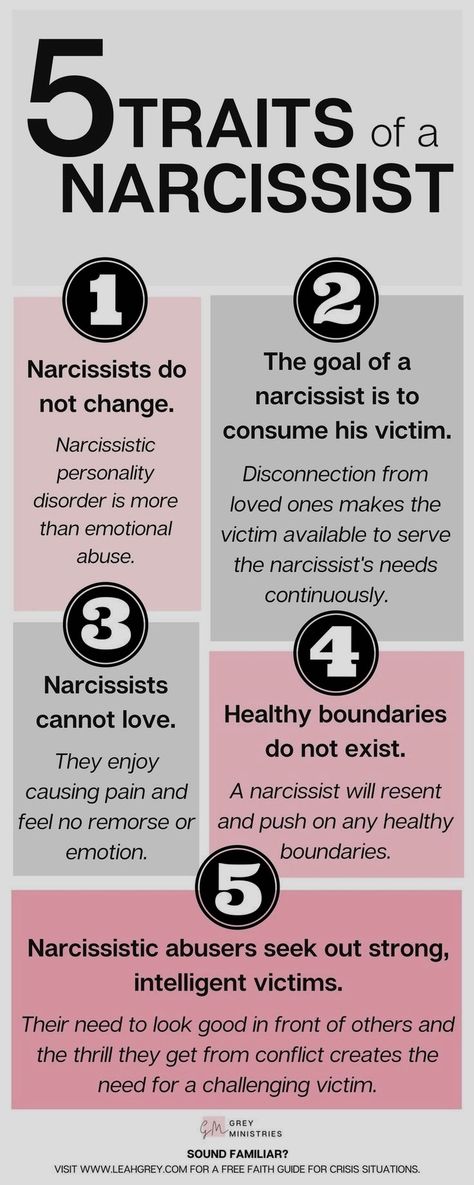 "
"
But the number of difficulties it causes is enormous. It's hard to be in a relationship, because we have huge problems with trust and shame. Narcissism is living in an eternal confrontation between the "real me" and the narcissistic façade.
Narcissists may have different stories of becoming a villain, but we all agree on one thing: we hate our real, weak selves. Because they were scolded by their classmates, their parents did not like them, they were too emotional and open to this world. We were all hurt at some point, after which our life was divided into “before” and “after”. And then for several years we built up armor, created the appearance of cheerful, unflappable, super-confident people who have no weaknesses and negative feelings like pain and sadness. But when we first come across the realization that we have been living a lie for so many years, it becomes scary and sickening.
Because returning to your real self - weak, stupid, useless - is worse than death for a narcissist.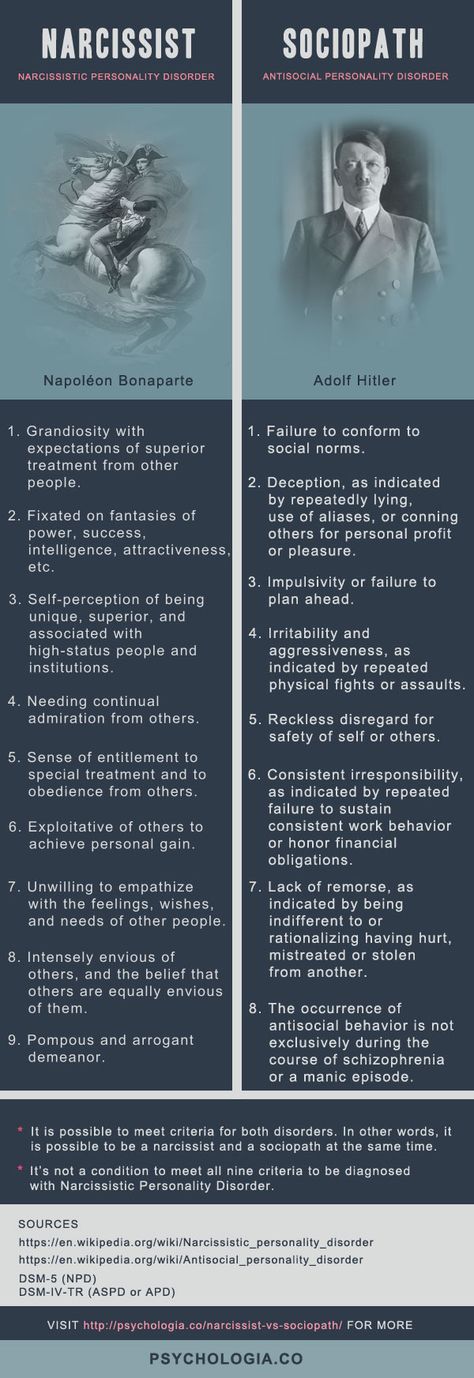
I would like to get rid of narcissism. Now I am undergoing drug therapy and drinking almost the maximum dose of an antipsychotic, which has alleviated both the symptoms of bipolar disorder and narcissism. But, unfortunately, there is still not enough money for psychotherapy, and with the doctor we limit ourselves to discussing symptoms and medications. I could tell the doctor more, but the disorder prevents even a psychiatrist from admitting his weaknesses.
I often envy "mere mortals" who genuinely enjoy buying a new pair of shoes, moving away from their parents, and even just good weather. I would like to learn how to open up to others, to be happy just because I have a job and a loved one, and not constantly think that I should become a star and move mountains.
— What is narcissism?
Narcissism is a concept that came to psychiatry from psychoanalysis, Sigmund Freud proposed it back in 1914 year. Today, there are many concepts regarding how it develops, manifests itself and how a psychotherapist should work with it.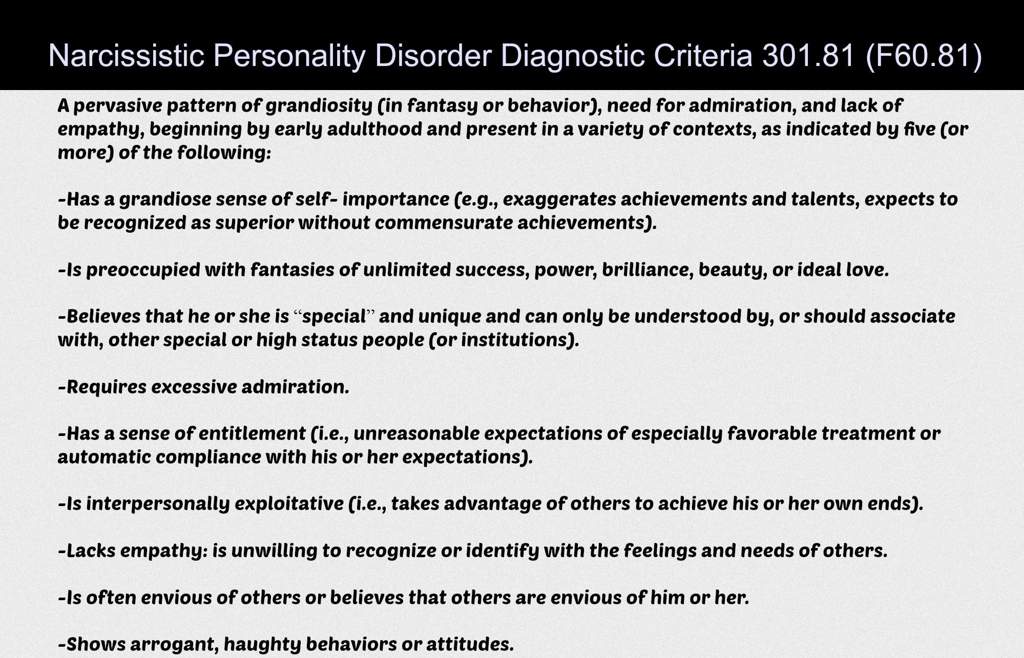 At the basis of this phenomenon lies the idea of one's own grandiosity and easily arising shame because of thoughts about one's imperfection.
At the basis of this phenomenon lies the idea of one's own grandiosity and easily arising shame because of thoughts about one's imperfection.
- When is it a disorder, and when is it just a personality trait?
Narcissism can be expressed in different degrees: from individual narcissistic reactions of a healthy personality to disorders of a psychotic level. The first case is normal, almost all people show such reactions in certain situations. For example, they react painfully to criticism, humiliation.
A person without narcissistic traits is a person without ambition, he lies on the couch and does not strive for anything.
There are many typical narcissistic personalities in big business and politics, because these are people for whom public recognition and external attributes of success come first. They need to move up within a clear hierarchy, they won't do something just because it's interesting and creative.
A personality disorder is when these reactions are so pronounced that they interfere with normal social life: work and, most of all, relationships with loved ones.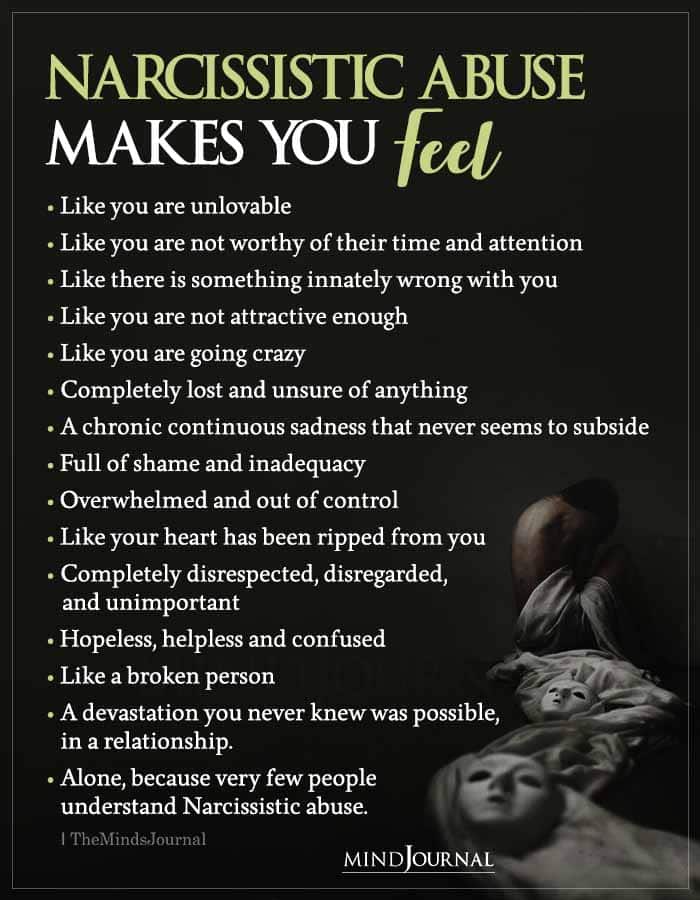 Such people are fixated on external success, the pursuit of excellence, the struggle for recognition. But their trouble is that they do not see, do not feel the emotions of other people, they often confuse where their own desires are, and where are the expectations of others.
Such people are fixated on external success, the pursuit of excellence, the struggle for recognition. But their trouble is that they do not see, do not feel the emotions of other people, they often confuse where their own desires are, and where are the expectations of others.
In Russia, the diagnosis of narcissistic personality disorder is usually not made. I think the reason is the domestic distrust of psychoanalysis, which was not officially recognized until the 1990s. Narcissism often co-occurs with other disorders, such as depression or bipolar disorder, and the patient gets help for this first.
There are also quite rare psychotic cases of narcissism, when the feeling of one's own grandiosity reaches the scale of delusions of grandeur or paranoia - it seems to the person that he is being watched, he is constantly discussed behind his back, all events revolve around his personality.
— What is the cause of narcissism?
Narcissistic personality disorder often develops in childhood.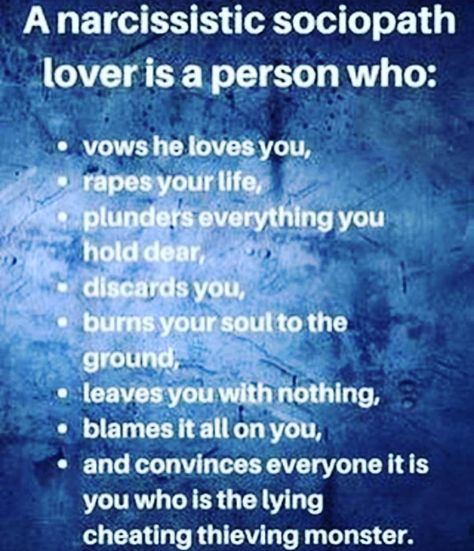 One possible reason is the so-called narcissistic expansion of one of the parents (usually the mother). Such a mother sees in the child not a separate personality, but a continuation of herself, a person who will fulfill her unfulfilled dreams and realize her ambitions. Narcissists are raised by parents who "always know what's best", scolding the child not for specific misconduct, but for the fact that they are "not the way they should be." A small child tries with all his might to earn praise, but, trying to live up to expectations, loses his own identity.
One possible reason is the so-called narcissistic expansion of one of the parents (usually the mother). Such a mother sees in the child not a separate personality, but a continuation of herself, a person who will fulfill her unfulfilled dreams and realize her ambitions. Narcissists are raised by parents who "always know what's best", scolding the child not for specific misconduct, but for the fact that they are "not the way they should be." A small child tries with all his might to earn praise, but, trying to live up to expectations, loses his own identity.
— Is there a link between narcissism and abusive behavior?
Contrary to popular belief, narcissism is not associated with violent tendencies. Narcissus is himself a sufferer, doomed to torment from his own imperfection. I wouldn't call him an abuser per se. Rather, due to his lack of empathy for those around him, he can be considered an "energy vampire." After all, this person is constantly busy not with a partner, but with himself.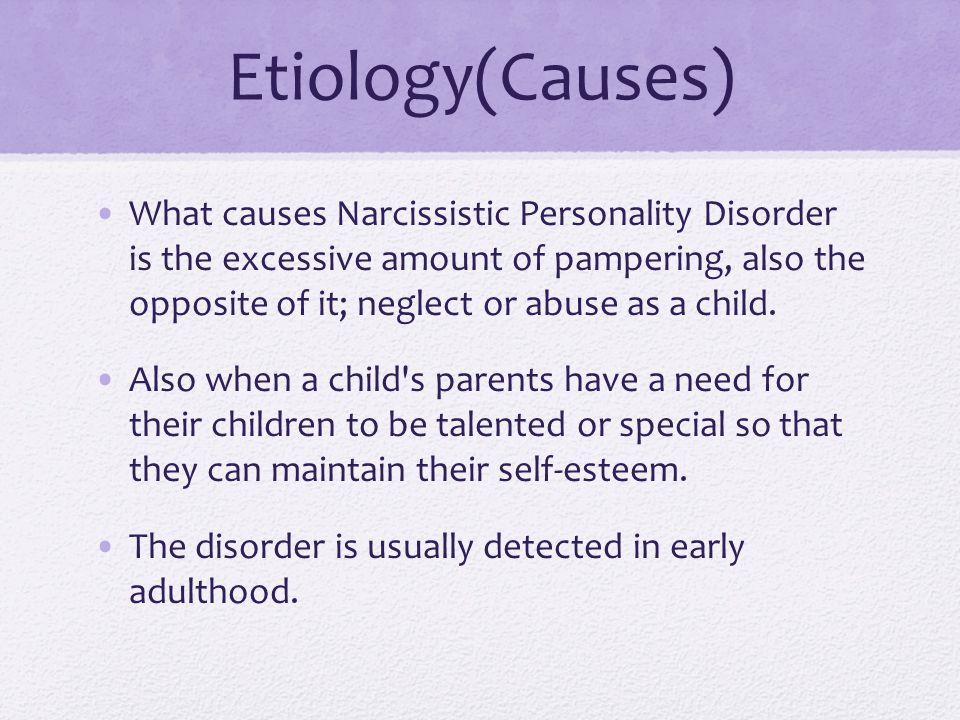 In relationships, he is concerned about how not to lose his grandiosity and protect himself from shame for his failure. The typical abuser is not a narcissist, not a psychopath, and not mentally ill at all. Usually this is quite a healthy boor.
In relationships, he is concerned about how not to lose his grandiosity and protect himself from shame for his failure. The typical abuser is not a narcissist, not a psychopath, and not mentally ill at all. Usually this is quite a healthy boor.
— Will psychotherapy or medication help a narcissist?
Narcissistic individuals usually seek the help of a psychiatrist or psychotherapist because of comorbid disorders, and not narcissistic traits per se. Often they do not have obvious psychopathological symptoms, there is only an underlying feeling that life does not add up, they cannot build relationships with loved ones.
Psychotherapy is difficult, because such a person usually has no interest in exploring his own deep problems, is prone to idealization and devaluation of others, including the psychotherapist. It is scary and painful for him to look into himself - and it is very traumatic to admit his weaknesses. If the client has the strong motivation, patience, and courage to deal with deeper issues, psychoanalysis can help. Then the question arises of choosing "your" therapist, whom you can trust.
Then the question arises of choosing "your" therapist, whom you can trust.
For severe psychopathological disorders such as severe anxiety, depression, any type of psychotherapy or psychoanalysis may be accompanied by minimal drug therapy.
Pathological lies can indicate mental disorders in a person
Drawing: Sergey KorsunAt any age a person can turn into a liar. And the reason for this are serious diseases. How to change the situation and what to do with such an ailment? Elizaveta Kucherova and Mikhail Ponomarev, clinical psychologists of the Psychiatric Clinical Hospital (PKB) No. 13, told YuVK about this.
Elizaveta Kucherova has been working at the 13th hospital for three years with patients with memory impairment. Mikhail Ponomarev is a candidate of psychological sciences, has eighteen years of experience working with patients, and specializes in rehabilitation programs.
She said that the deputy
No matter how hard the patient tries to deceive the doctor, the specialist will notice the peculiarities of thinking.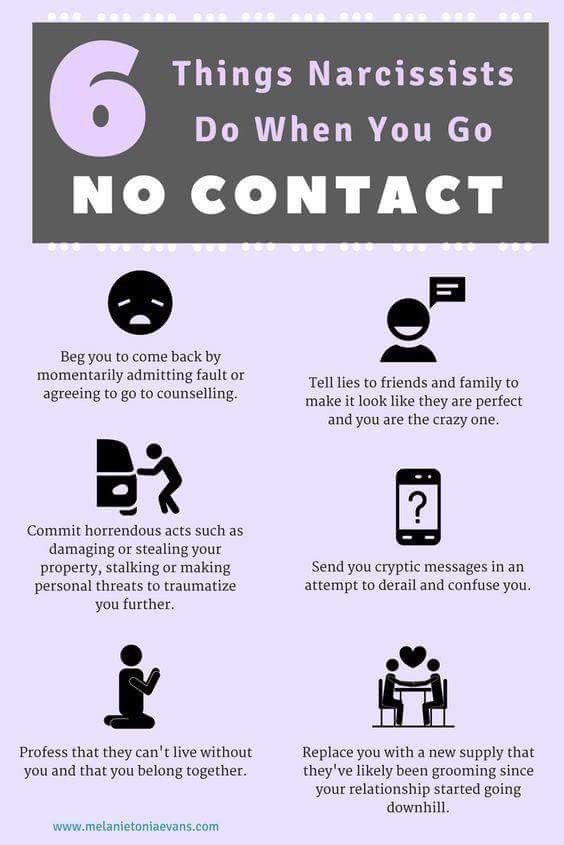
“Usually, such a disorder as constant pathological lying is “attached” to other personality disorders,” says Kucherova. - With antisocial disorder, compassion is alien to a person, he ignores social norms, he has no attachments.
Here lies act as an effective manipulator tool. In borderline disorder, when mood swings are common, people tend to sugarcoat reality. And narcissists, who are internally deeply insecure people, create an aura of originality and ideality around themselves with a lie.
- Once a woman from Kuzminki came to see me. She was worried about her bad mood, the doctor continues. - She told fantastic "facts" of her biography. That she is a deputy, she had 10 richest husbands, she was treated abroad. All this was a lie. The woman is an ordinary housewife. She was diagnosed with a narcissistic disorder, where lies became a tool for creating an image. She was prescribed medication, psychotherapy. The treatment took less than a year.
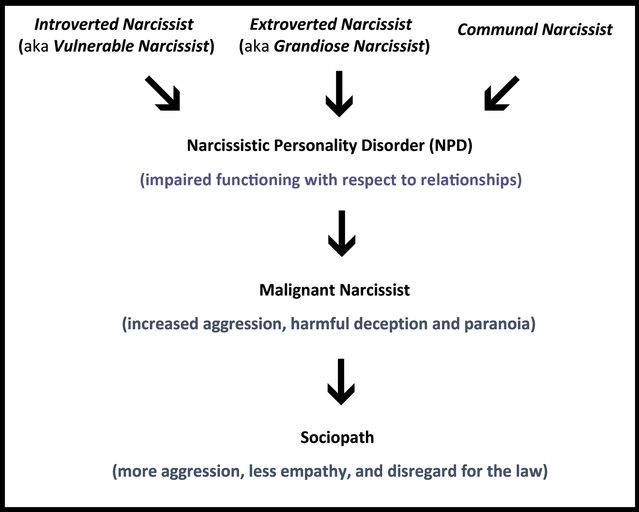
Lying helped to detect dementia
Doctors have special tests that help determine the type of disorder.
— Relatives of a retired woman from Maryin brought her to me for an appointment: my grandmother wrote unprecedented stories, — says Ponomarev. - She jumped from one thought to another: either she lives at the royal court, then right there - that a cow was stolen from her. She was examined and found to have frontotemporal dementia. Medical treatment significantly smoothed her condition.
A habit can turn into a disease
“Lying is conditionally normal when it is the goal of avoiding bad consequences,” Ponomarev says. - But, alas, a habit in this way can develop into a pathology. A 14-year-old teenager from the Lyublino district came to me for an appointment, brought by his mother: she was worried about her son's frequent lies. After all, liars do not understand that it becomes very noticeable.
